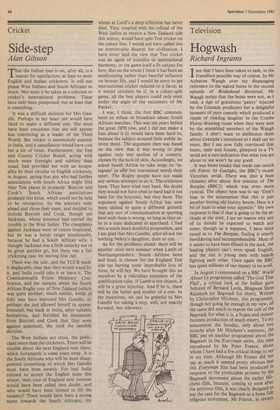Cricket
Side-step
Alan Gibson
That the Indian tour is on, after all, is a matter for satisfaction, at least to most English and Indian cricketers. It will not please West Indians and South Africans so much. Nor must it be taken as a solution to cricket's international problems. These have only been postponed; but at least that is something.
It was a difficult decision for Mrs Gandhi. Perhaps in her heart she would have liked to make a different one. She must have been conscious that she will appear less convincing as a leader of the Third World. But cricket is enormously popular in India, and a cancellation would have cost her a lot of votes. Furthermore, the Test and County Cricket Board, acting with much more foresight and subtlety than usual, had provided her with an escapealley by their circular to English cricketers, in August, saying that any who had further associations with South Africa might find their Test places in jeopardy. Boycott and Cook's South African associations predated this letter, which could not be held to be retroactive. So the selectors went ahead and chose their team, and decided to include Boycott and Cook, though not Jackman, whose presence had started the trouble in the West Indies. The complaints against Jackman were of course irrational, but he was a better target emotionally, because he had a South African wife. I thought Jackman was a little unlucky not to be given another go, but there was a fair cricketing case for leaving him out.
There was the side, and the TCCB made it implacably clear that they would stand by it, and India could take it or leave it. The Commonwealth Prime Ministers' Con ference, and the rumpus about the South African Rugby tour of New Zealand (which was quite another, much nastier, kettle of fish) may have bemused Mrs Gandhi, or perhaps she just allowed herself to appear bemused, but back in India, after suitable hesitations, and fortified by statements from Boycott and Cook that they were against apartheid, she took the sensible decision.
The West Indians are cross, the politicians more than the cricketers. There will be trouble about the next England tour there, which fortunately is some years away. It is the South Africans who will be most disappointed (something of which Mrs Gandhi must have been aware). For had India refused to accept the English team this winter, their tour of England next summer would have been called into doubt: and who would have been invited to fill the vacancy? There would have been a strong move towards the South Africans, for whom at Lord's a deep affection has never died. This, coupled with the refusal of the West Indies to receive a New Zealand side this winter, would have split Test cricket on the colour line. I would not have called this an irretrievable disaster for civilisation. I have never held the view that Test cricket was an agent of morality or international harmony, or the game itself a fit subject for love. But on the whole I think it has been an ameliorating rather than baneful influence on human life, and I would be sorry to see international cricket reduced to a farce, as it would certainly be if, in a colour-split game, all the best players could only meet under the aegis of the successors of Mr Packer.
I was, I think, the first BBC commentator to refuse to broadcast about South African matches. This was ten years before the great 1970 row, and I did not make a fuss about it (it would have been hard to, because the subject aroused little public interest then). The argument then was based on the view that it was wrong to play against only one section of a country, chosen by the luck of skin. Accordingly, we asked South Africa to take steps to 'integrate' (a silly but convenient word) their sport. The Rugby people have not made any serious attempts to do it. The cricketers have. They have tried very hard. No doubt they would not have tried so hard had it not been for the boycotts, but they have. The argument against South Africa has now been shifted to quite a different ground: that any sort of communication at sporting level with them is wrong, so long as they exist in a state dedicated to apartheid. I find this a much more doubtful proposition, and I am glad that Mrs Gandhi, after all not for nothing Nehru's daughter, does so too.
As for the problems ahead: there will be another crisis next summer when Lamb of Northamptonshire, South African born and bred, is chosen for the England Test side (as barring some improbable loss of form, he will be). We have brought this on ourselves by a ridiculous extension of the qualification rules. If Lamb is not chosen, it will be a gross injustice. And if he is, there will be the father and mother of a row. In the meantime, we can be grateful to Mrs Gandhi for taking a step, well, not exactly forward, but sideways.


























































 Previous page
Previous page